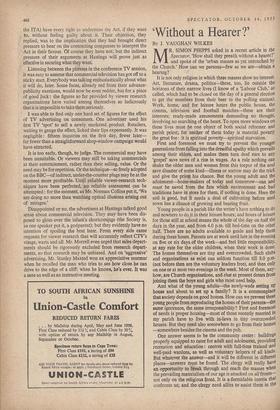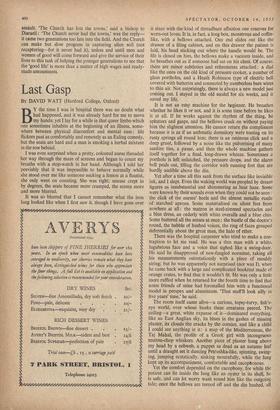`Without a Hearer ?'
BY J. VAUGHAN WILKES R. SIMON PHIPPS asked in a recent article in the Spectator, 'How shall they preach without a hearer?' and spoke of the 'urban masses as yet untouched by the Church.' How can we parsons—few as we are—obtain a hearing?
It is not only religion in which these masses show no interest. Art, literature, drama, politics—these, too, lie outside the horizons of their narrow lives (I know of a 'Labour Club,' so called, which had to be closed on the day of a general election to get the members from their beer to the polling station). Work, home, and for leisure hours the public house, the cinema, television and football matches—these are their interests; ready-made amusements demanding no thought, involving no searching of the heart. To open more windows on these lives must be one object of both social reformer and parish priest; for neither of them today is material poverty the great foe : it is spiritual poverty—spiritual starvation.
First and foremost we must try to prevent the younger generations from falling into the dreadful apathy which prevails among their elders, and makes them turn deaf ears to any `gospel' save news of a rise in wages. As a rule nothing can shake the older men and women from this torpor of the soul save disaster of some kind—illness or sorrow may do the trick and give the priest his chance. But the young adult and the adolescent—home-makers of today and tomorrow—can and must be saved from the fate which environment and bad traditions have in store for them, if nothing is done. Here the soil is good, but it needs a deal of cultivating before seed sown has a chance of growing and bearing fruit.
Young people in a parish like the writer's have nothing to do and nowhere to do it in their leisure hours; and hours of leisure for those still at school means the whole of the day on half the days in the year, and from 4.0 p.m. till bed-time on the other half. There are no adults available to guide and help theta during these hours. Parents are at work until late in the evening on five or six days of the week—and feel little responsibility, at any rate for the older children, when their work is done. The homes themselves are tiny and overcrowded. Such clubs and organisations as exist can seldom function till 8.0 p.m• (not before then are the voluntary leaders free), and then only on one or at most two evenings in the week. Most of them, any how, are Church organisations, and that at present deters from joining them the boys and girls who most need help.
And what of the young adults—the newly-weds setting uP house and about to set up a family? It is a commonplace that society depends on good homes. How can we prevent these young people from reproducing the homes of their parents—the same ignorance, the same irresponsibility? First and foremost of needs is proper housing—most of those recently married in my parish have to live with in-laws in tiny overcrowded houses. But they need also somewhere to go from their homes —somewhere besides the cinema and the pub.
One answer seems to be the community centre : buildings properly equipped to cater for adult and adolescent, providing recreation and education : centres with full-time trained and well-paid wardens, as well as voluntary helpers of all kinds. But whatever the answer—and it will be different in different places—answers must be found. The clergy will really have an opportunity to break through and reach the masses when the prevailing materialism of our age is attacked on all fronts— not only on the religious front. It is a formidable inertia that confronts us; and the clergy need allies to assist them in the assault `The Church has lost the towns,' said a bishop to Disraeli : 'The Church never had the towns,' was the reply— it came two generations too late into the field. And the Church can make but slow progress in capturing alien soil (not recapturing—for it never had it), unless and until men and women of good will come forward and give the service of their lives to this task of helping the younger generations to see that the 'good life' is more than a matter of high wages and ready- made amusements.











































 Previous page
Previous page